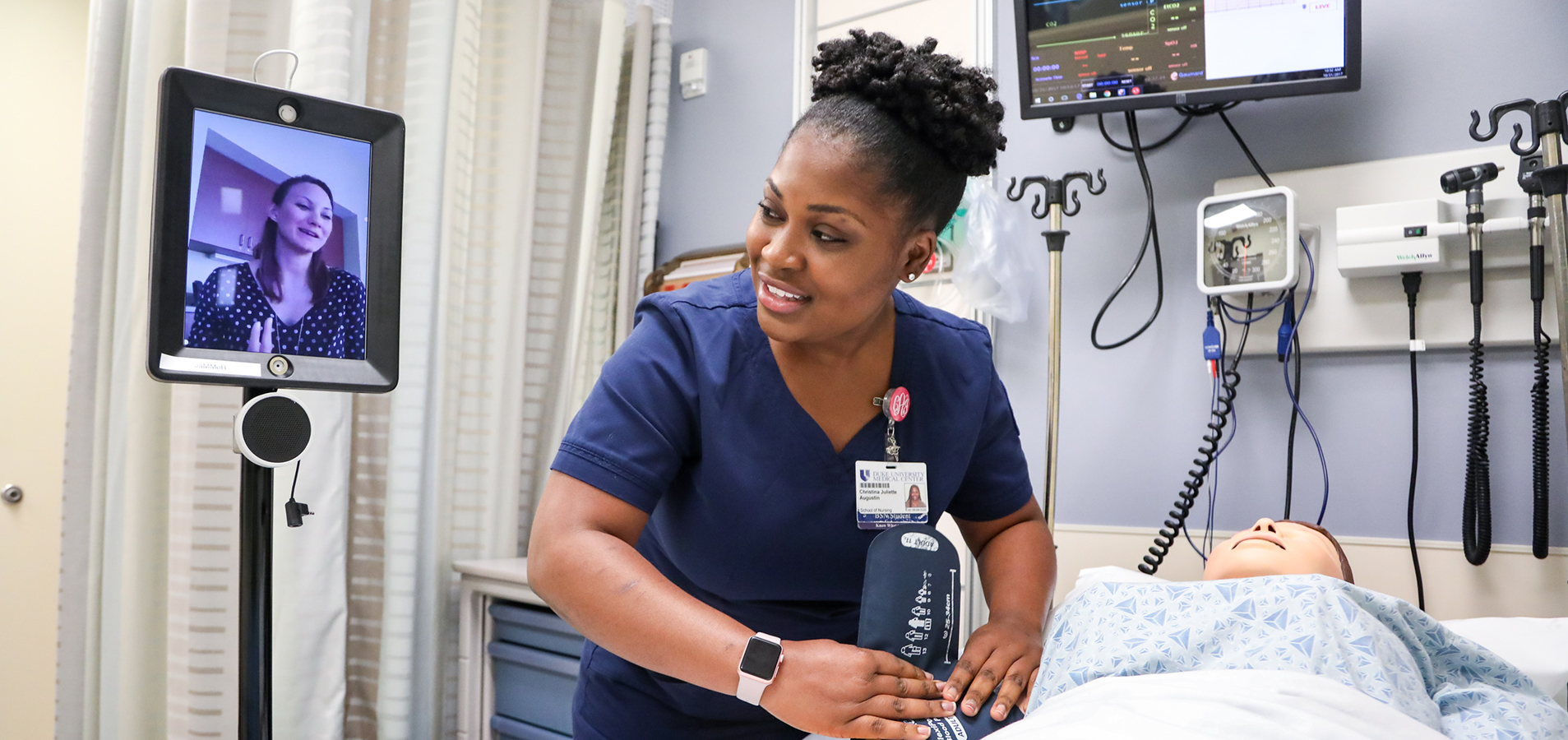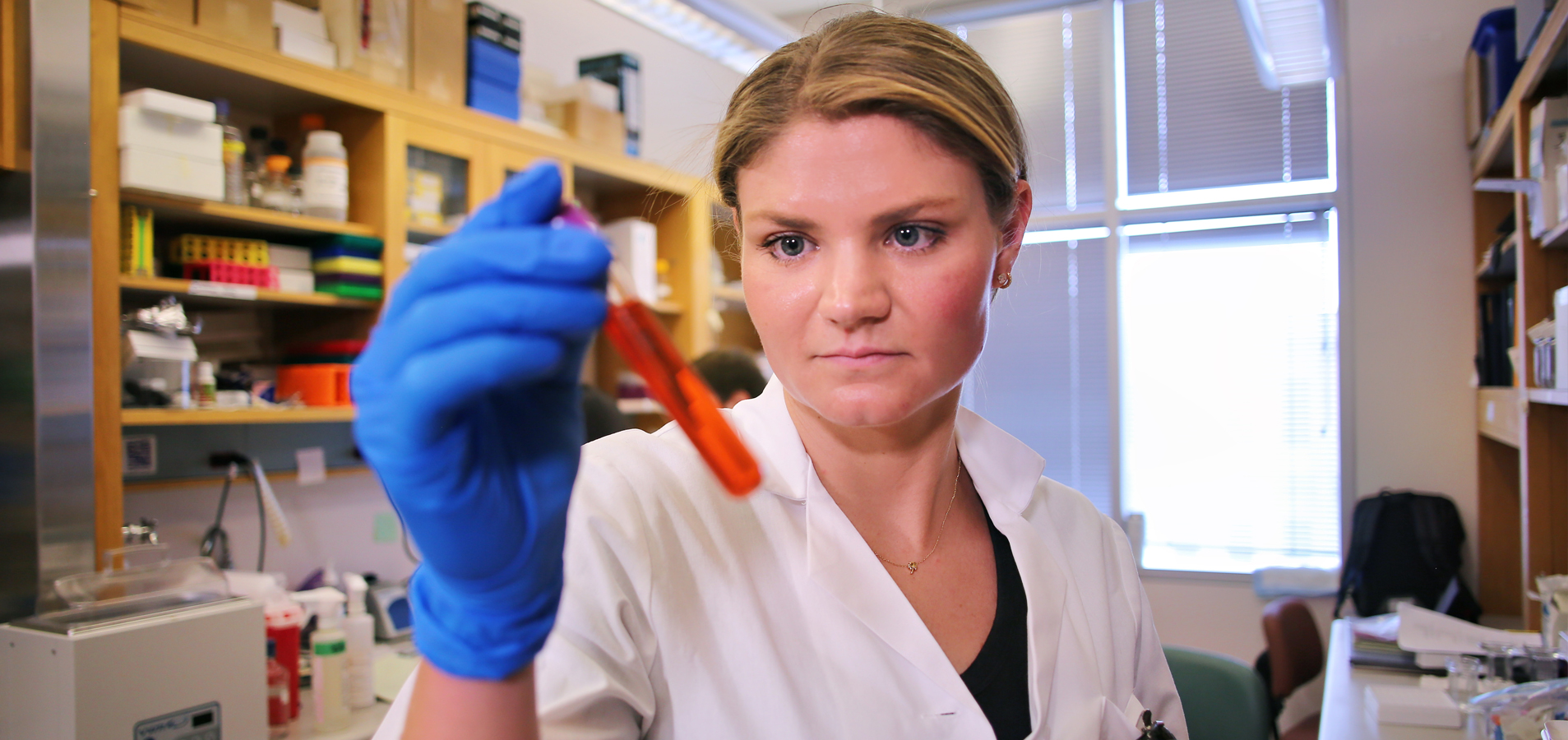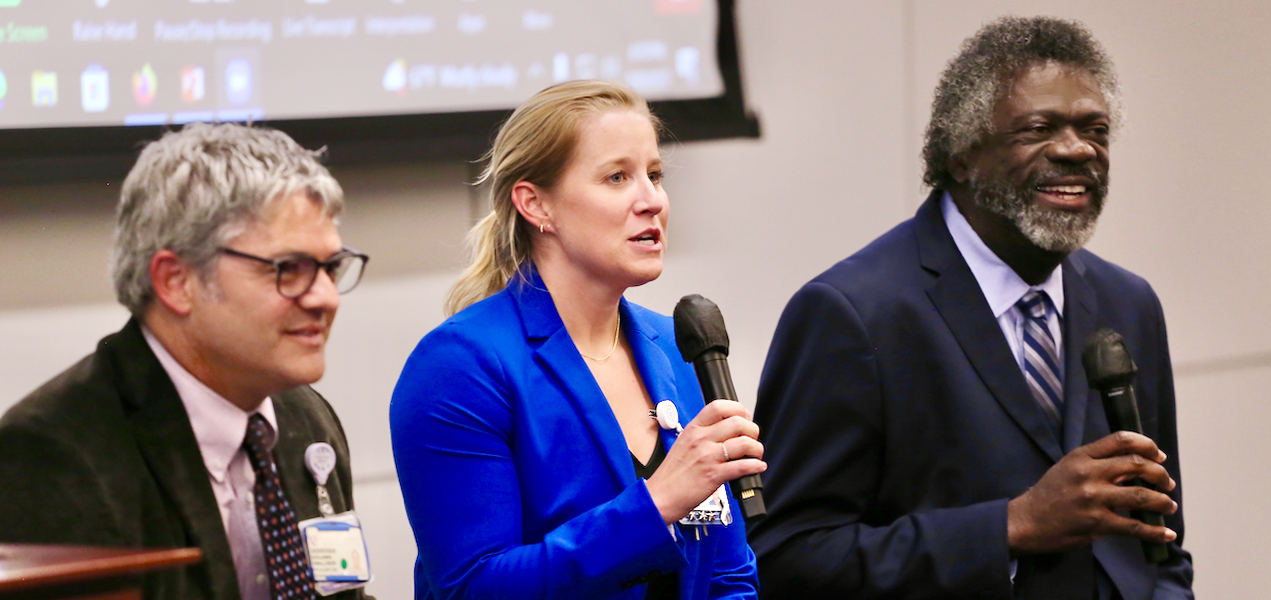Advance equitable care and improve health outcomes across diverse populations with a PhD in Nursing.
Prepare to lead and transform nursing practice, policy, and research to promote health equity and social justice with Duke University School of Nursing’s PhD Program in Nursing.
Our nursing PhD empowers you with the skills and confidence to develop and test nurse-led models of care that enhance the health of all people, especially those experiencing health inequities. You’ll learn to drive change in nursing practice, influence health policies and conduct research that champions health equity and social justice. Plus, PhD student tuition and 12-month stipends are fully funded for up to five years.
We pride ourselves on welcoming a select group of talented and diverse students each year. As a nursing PhD student, you’ll have the unique opportunity to work closely with our expert faculty members, benefiting from one-on-one mentorship alongside your formal studies.
PhD Program in Nursing Highlights
Our PhD in nursing equips you with exceptional expertise, setting the stage for transformative career opportunities in nursing science and leadership. Through coursework, unparalleled mentorship from expert faculty and exposure to hands-on research opportunities, our nursing PhD shapes the next generation of nursing leaders with a strong emphasis on championing health equity:
Connections with expert faculty:
Our nursing PhD faculty will socialize you into the role of a nurse scientist, ensuring you gain the necessary knowledge and skills to launch a successful independent research program post-doctorate. Your connections with nursing research experts will prepare you for an entry-level role as a nurse scientist in various research settings, including academic, clinical or industry environments.
Empowering research opportunities:
Gain experience in traditional and innovative research methodologies and thorough statistical training. Our PhD nursing program emphasizes the importance of mentored research and teaching experiences to enhance knowledge and skill development.
Championing health equity:
The PhD Program in Nursing offers a comprehensive understanding of the philosophy of science, focusing on addressing complex health issues, especially those concerning health equity, social determinants and justice.
What Can You Do With a Nursing PhD?
Nurses with PhDs play a pivotal role in shaping the future of health care. Our graduates pursue post-doctoral education and move into leadership positions in academia, industry, research institutions and government, advancing nursing theory and practice.
With Duke University’s PhD in nursing program, you’ll be able to:
- Master key concepts in health equity and nurse-led models of care to improve health outcomes.
- Design and conduct research using interdisciplinary.
- Evaluate research with a focus on health equity and nurse-led models of care.
- Maintain ethics and integrity in research.
- Apply advanced methods to research design and analysis.
- Collaborate effectively with diverse teams.
- Publish and present research to advance nursing and promote social justice.
This expertise will prepare you to improve access and equitable health care through roles in:
- Academia: As faculty, PhD prepared nurses equip the next generation of nurses and nurse scientists, blending education, research and service, which may include practice and policy work.
- Leadership and advocacy: A nursing PhD positions you as a leader in clinical settings, health policy and governmental agencies, driving innovations in nursing practice, health care delivery and policy.
- Research: Lead the design and conduct of research studies, secure grants, analyze scientific data and disseminate findings through presentations and publications with your nursing PhD Our program prepares you to conduct high-impact research, design studies, write grant proposals and analyze data using a health equity lens.
PhD Program in Nursing Description
The program requires a minimum of 52 credit hours of graduate coursework. Students will work on research projects; it is expected most will graduate with several publications. Coursework is structured with a substantive core of nursing science and research methods to be taken in the School of Nursing. This core is expanded with elective courses that typically support the student’s dissertation and future research career. These can be taken in other Duke University departments or other Universities that have arrangement with Duke (i.e., University of North Carolina at Chapel Hill, North Carolina State University, North Carolina Central University). Additional requirements include research practicums and elective credits that may count towards specialty certificates (i.e., teaching, global health, data science, entrepreneurship, etc.).
In addition to course work, the PhD Program in Nursing will require each student to develop a scholarly portfolio, successful completion of a preliminary examination, and a dissertation. Students are expected to disseminate their work through scholarly venues such as publications and conference presentations.
Terminal Objectives
After the PhD Program in Nursing, students will be able to:
- Demonstrate advanced knowledge of health equity, social determinants of health (SDOH), and nurse-led models of care to improve health outcomes for a population and/or system of care.
- Apply conceptual models and theories from nursing and other relevant disciplines to design and conduct research.
- Use a health equity, SDOH, and/or nurse-led models of care lens to appraise research conducted in nursing and other disciplines.
- Demonstrate scientific integrity and ethics across all phases of the research process.
- Apply appropriate methods and analytic strategies to design, conduct, and evaluate research from discovery to translation.
- Integrate socioculturally responsive approaches throughout the research process.
- Disseminate research through a variety of venues to advance nursing science, health equity, and social justice.
Assistant Dean
Mitchell Knisely
PhD, RN, ACNS-BC, PMGT-BC, FAAN
Mitchell Knisely is an Associate Professor at Duke University School of Nursing and Assistant Dean of the PhD Program. His research focuses on the application of precision health approaches to understand and ameliorate pain and promote equitable pain care in individuals with sickle cell disease and other chronic pain conditions. His program of research includes studies seeking to understand biopsychosocial contributors to individuals' pain experiences, as well as pragmatic clinical trials evaluating the use of non-pharmacological interventions for the treatment of acute and chronic pain.
Learn more about Mitchell Knisely: Scholars@Duke
PhD Nursing Admissions
The Nursing PhD Program employs a holistic admissions strategy to evaluate prospective students. Our team assesses an applicant’s unique experiences in addition to traditional academic metrics, considering a wide array of factors indicative of the applicant’s potential for academic and professional success.
If you need additional assistance, contact our PhD Program Office: sonphdprogram@duke.edu.
PhD Student Bios
Financial Aid for PhD Nursing Students
Ph.D. student tuition and 12-month stipends are fully funded for up to five years. As a Ph.D. student, you’ll receive a competitive package that should provide financial support (tuition, stipend, health insurance) for the majority of the time you are registered and working toward your degree. Ph.D. students are supported in various ways, including funding from the School of Nursing, Graduate School and other governmental and private sources.
Learn More About Guaranteed Funding for Ph.D. Students














































